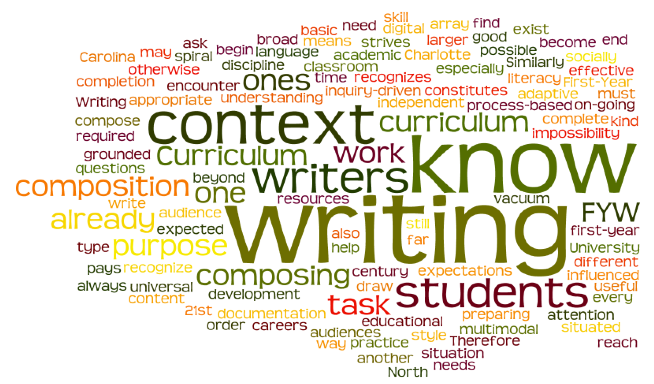Writing is foundational to the overall success of all UNC Charlotte students. When faculty in the University Writing Program started discussing changes to the first-year writing curriculum, the focus was on discovery of the best way to provide knowledge and support.
This fall, roughly 60 percent of freshmen and transfers are taking a new four-credit hybrid writing course designed to provide student-writers with writing knowledge they need and additional support and practice through an online series of writing studios. The course is UWRT 1104, “Writing and Inquiry in Academic Contexts with Studio.”
“From a theoretical point of view, we wanted to discover the best way to teach first-year students, so they can be successful in the writing they will do after they leave our first-year writing classes,” says Joan Mullin, professor of English and executive director of the University Writing Program.
“Our research showed that one learns to write over time and with practice, and writing strategies shift depending upon the audience, context and content,” Mullin says. “Writing for one discipline, such as history, may require critical analysis, knowledge of certain conventions and types of evidence that may not be the case for another field.”
Given that students improve their writing ability when they compose different kinds of texts throughout their UNC Charlotte careers, faculty from the University Writing Program focused on what students need as a basis for their writing development and how to best utilize time in class.
“First-year writing shifts students’ understanding of writing and gives them strategies to analyze future writing situations — but then students need to continually practice in other situations,” Mullin says.
Implementation of the writing course followed a pilot involving 11 sessions in fall 2015, which followed more than a year of discussion, planning, research and surveys. A team of University Writing Program faculty worked on the project with Jaesoon An, a senior instructional designer in the UNC Charlotte Center for Teaching and Learning, with funding from the Provost’s Office. The project was part of the University’s effort to redesign large enrollment courses.
First-year writing lecturers Meaghan Rand, Lucy Steele, Kendra Andrews and Debarati Dutta were involved in the planning and development of the course.
They and colleagues researched writing programs at other universities similar to UNC Charlotte and studied how technology was transforming writing and how writing is taught. They also researched students’ use of writing in digital spaces, through blogs, texting and social media, such as Reddit and other websites.
Teaching should focus on strategies of writing that students can learn to adapt to multiple contexts, Rand and Dutta say. They note that writing expectations and information systems shift, so students must develop approaches to writing that are fluid and adaptive.
Research shows that students need time to practice and explore different writing contexts, be provided a space to take risks as writers and obtain feedback from various audiences. The online studio provides such a place. First-year writing instructors have 16 studio projects that reinforce core concepts from the classroom and provide an instructional and exploratory sandbox for writers to work with these new concepts using a variety of new media tools and technologies.
Because the studio projects can be used in any sequence, faculty instructors are able to adopt, adapt or create their own, Dutta says.
“The studio invites student writers to develop a broader and more nuanced conception of what writing is, what it does, and what it means to write in the 21st century,” Dutta says.
“Studio projects help writers read and engage with different genres,” she says. “It becomes a safe space for writers to play with new concepts, tools and genres and to share their work with their peers and the instructor for feedback. The ‘play’ aspect of these projects allows both exploration and inquiry through deep reading, rhetorical analysis and production. Students wonder: what are the features of the text, what is being said, how is it being said, who is speaking, who is my audience, how does my context shape the message?”
Surveys of students and faculty who participated in the pilot were positive, and from an administrative standpoint, the new course has enabled the University Writing Program to reduce its reliance on part-time faculty. This is a beneficial outcome, as the program can better deliver a consistent instructional experience through having primarily full-time faculty members and a small cadre of excellent adjuncts, Mullin says.
An, the CTL senior instructional designer, praised the redesign work completed by the University Writing Program.
“They really put in a great deal of effort into this project,” An says. “The faculty were very active in the redesign, and the team created a wonderful online resource guide for instructors that provides them assistance with the use of technology and the structuring of the online studio component. Results of the pilot indicated that the dropout, withdrawal, failure rate, which was already low, improved, and the rate of A’s increased, which indicated a better mastery of the subject.”








